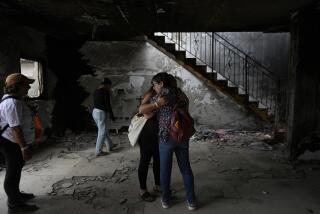Calm Prevails at Ramadan Prayer Gathering in Jerusalem
- Share via
JERUSALEM — Thousands of Muslim men and women gathered at Jerusalem’s Al Aqsa mosque to pray on the first Friday of Ramadan, returning to the disputed site that has figured so prominently in more than two months of Israel-Palestinian bloodshed.
With an army of Israeli police officers deployed on foot and horseback in and around Jerusalem’s walled Old City, the prayers unfolded in relative calm. There were only a handful of skirmishes, allaying fears of a new escalation.
This first Friday of the Muslim holy month capped a week that registered a marked decrease in the gun battles and deadly sniper shootings that have come to characterize what Palestinians call the Al Aqsa intifada, which erupted after hawkish Israeli opposition leader Ariel Sharon visited the site Sept. 28.
By no means has the violence stopped: On Friday, two Palestinians--one a 12-year-old--were reported killed in clashes in the West Bank city of Hebron and the Gaza Strip town of Rafah. Israelis and Palestinians traded gunfire at several hot spots, including the West Bank city of Ramallah, and an Israeli passenger bus came under gunfire on the northern edge of Jerusalem. There were no injuries in the bus attack.
But Israeli and Palestinian officials suggested that political initiatives may be overshadowing physical clashes, at least for now. Israeli Prime Minister Ehud Barak, facing early elections, has floated a new, if limited, peace plan, while Palestinians are increasingly vocal in their demands that Palestinian Authority President Yasser Arafat do more to rein in violence that has been far more deadly to Palestinians than to Israelis.
In a gesture, Israel allowed the Palestinian airport in Gaza to open Friday after more than a month. Palestinians see the airport as an important symbol of self-rule.
For Friday prayers, Israel eased restrictions by allowing all Arabs with Israeli citizenship and Palestinians who live in Jerusalem to enter the Al Aqsa compound. In the weeks since the violence erupted, males under 45 have been banned, and the number of worshipers on Fridays, the Muslim Sabbath, has plummeted.
On Friday, Israel did bar all Palestinians who live in the West Bank and Gaza from entering the Old City during prayer time. Israeli Foreign Minister Shlomo Ben-Ami said that if the first Ramadan Friday passed without incident, restrictions might be eased further.
“I’m not happy, because not all the Muslims are allowed to come here,” said Mazen Sablimeh, 25, of East Jerusalem, who came to pray in the Old City for the first time in two months. “People from Ramallah, Hebron, Nablus [and] Jericho cannot come.”
“I feel like I’m walking in a military camp,” said 25-year-old Khaled Obeid, eyeing the Israeli border police who stood shoulder to shoulder blocking the entrance to Damascus Gate on the northern side of the Old City. Several thousand police officers in riot gear lined the Old City’s cobblestone streets and circled the gates leading to the Al Aqsa compound. But none intervened.
The region’s deadliest fighting in years flared after Sharon entered the compound where Al Aqsa is located to assert Israel’s claim to all of Jerusalem. Jews revere the site as the Temple Mount, where the biblical Jewish temples once stood. Muslims know it as Haram al Sharif, or “noble sanctuary,” and are demanding the eastern half of Jerusalem as their future capital.
The following day, Israeli police stormed the compound to crack down on demonstrators who were throwing rocks on Jewish worshipers at the Western Wall below. Six Palestinians were killed, among the first fatalities in a conflict that has since claimed about 290 lives.
But Friday, plainclothes Palestinian security officials and members of the Islamic Trust, or Waqf, which runs the compound, combined efforts to keep a lid on demonstrations.
The prayers concluded, about 100 Palestinian youths bunched outside an eastern entrance known as Lions’ Gate, hurled rocks at police and chanted “Muhammad’s army will never die!”
As police retreated to nearby stone portals without retaliating, Waqf officials stopped the demonstrators. After about an hour’s standoff, the Islamic officials shooed the boys away, swatting some with prayer mats and telling them to move along.
“We believe they wanted quiet on Temple Mount because they want to continue praying the next three Fridays,” Israeli police spokesman Shmuel Ben-Ruby said. “They want Ramadan to be quiet.”
By contrast, police said that another Waqf official tried to incite the crowd, and the day’s sermon also took a belligerent tone in recounting Israeli retaliatory actions against Palestinians.
Israeli police said 100,000 Muslims entered the compound, a number that seemed very high to journalists present. Waqf officials estimated the crowd at 25,000 to 40,000.
During normal years, hundreds of thousands of Muslims are likely to worship at the Al Aqsa shrine on the four Fridays of Ramadan, many bused in from as far away as Gaza.
*
Times staff writer Soraya Sarhaddi Nelson contributed to this report.
More to Read
Sign up for Essential California
The most important California stories and recommendations in your inbox every morning.
You may occasionally receive promotional content from the Los Angeles Times.











